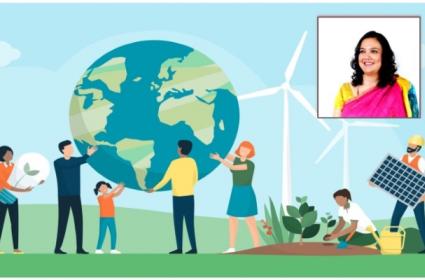India's 'whole of society' approach, SDG localization model effective devices for sustainable development: Chief of global philanthropy network

By Reshmi AR
As India Presides over G20 2023, it is presented with an opportunity to forge consensus for aiding fast-paced sustainable development in the Global South. India’s ‘whole of society’ approach to development, which seeks to unlock success towards the 2030 UN Sustainable Development Goals (SDGs) by engaging sub-national and local governments, civil society organizations, local communities, and the private sector to realize the Goals, has received praise from key stakeholders. India has also developed a holistic SDG localization model centred on adoption, implementation and monitoring at the State and district levels. These interventions will help our country attain SDGs faster, even as we continue to battle challenges along the way.
In an exclusive interview with Reshmi AR of Sakshi Post, Naina Subberwal Batra, CEO, Asian Venture Philanthropy Network talks about the imperatives for India and the role we can play in leading efforts towards sustainable development in emerging economies.
Q.1 The G20 Presidency has come to India in 2023, from another country from the Global South - Indonesia, and will travel to Brazil next, followed by South Africa. What is the significance that you see in developing countries chairing the G20 one after the other?
The G20 members represent around 85% of the global GDP, over 75% of global trade, and about two-thirds of the world population. Therefore, with the Global South being in focus for consecutive G20 convenings – there is massive scope for developing countries to direct attention to their critical socio-economic challenges, find solutions that promote growth, reconsider development pathways, and discover ways to achieve the Sustainable Development Goal’s (SDG) targets. The coming together of the G20 in developing countries over the next few years e.g. Brazil and South Africa in 2023/24 is extremely promising, as it will help shift global focus to the knowledge, expertise and financial resources required to address the development trajectories that have gone off-track.
Q.2 What lacunae do you see in social development in India? How can collective action play a part in addressing these?
India is still facing significant socio-economic challenges, while trying to recover and build resilience in the post-pandemic era. Coupled with the threat of climate change and a looming global recession, collective action offers a model to help us to move forward in strengthening social development in the country. The future needs to be inclusive and sustainable, where no one is left behind, and to do this we need various state actors and private organizations to come together and pool resources to support those who most need it.
To champion the transformative nature of collective action, we will be organizing our annual ‘South Asia Social Investment Summit 2023’ from 19th to 20th January 2023. We will be inviting our members from across our global network, to participate in dialogues that look to set the path for a cohesive development agenda for the South Asia region. Over two days, participants will engage in dialogue to spotlight effective public-private sector partnerships on issues including Gender Equality, Livelihood opportunities for Youth, Climate Action and Just Energy Transition, Health Equity and Preparedness, and Ecosystem Development.
Through this event, we aim to forge collective action for social development and unpack the role of the private and social sectors in contributing to just social development across South Asia. Running parallel with India’s G20 Presidency, the Summit aims to push critical conversations on strategically mobilizing capital to create and scale transformative impact.
Q.3 Financing of social development initiatives is a major impediment for developing countries. What are some of the innovations in the works to ease this burden?
Innovative Finance has the potential to play an important role in driving long-term economic growth and sustainable development. Therefore, scale financing opportunities need to be identified in developing countries for driving holistic social development. Best practices, case studies and implementation pathways need to be shared among developing nations to understand what will uplift the APAC region.
Blended finance mechanisms are also helping connect public and private individuals and entities to facilitate new ways of addressing pressing environmental and social issues that require a critical mass of capital.
For example, AVPN has conducted a landscape study to identify potential funding opportunities and a potential pipeline of direct deals, funds, and innovative finance vehicles, capital providers and capacity builders in the healthcare sector in India.
Q.4 Which are the areas that require particular attention from Indian policymakers so India can swiftly climb the ladder of attainment of sustainable development goals?
India is currently home to one-sixth of all of humanity. If we can address the SDGs in India, we will make an important contribution to achieving these global goals. Policymakers in the country have made a paradigm shift to a ‘whole of society’ approach when it comes to unlocking success towards the 2030 SDGs, with the Government of India engaging sub-national and local governments, civil society organizations, local communities, and private sector with a singular agenda of realizing the Goals. Based on the evidence from the SDG India Index, which measures progress at the subnational level, India has developed a holistic SDG localization model centred on adoption, implementation and monitoring at the State and district levels.
India’s G20 Presidency has also made accelerating progress on SDGs as one of its principal priorities, as 2023 marks the crucial midpoint of the 2030 Agenda. However, it’s also important to note that the devastating effects of COVID-19 have made the Decade of Action into a Decade of Recovery. The key priority areas that India has determined for the G20 will help in this endeavour towards recovery and the eventual attainment of the SDGs, and include crucial focus points of green development, climate finance and inclusive growth among others. Women-led development will also be at the core of India’s G20 deliberations, a much-needed impetus to get all hands-on deck for global progress.



















